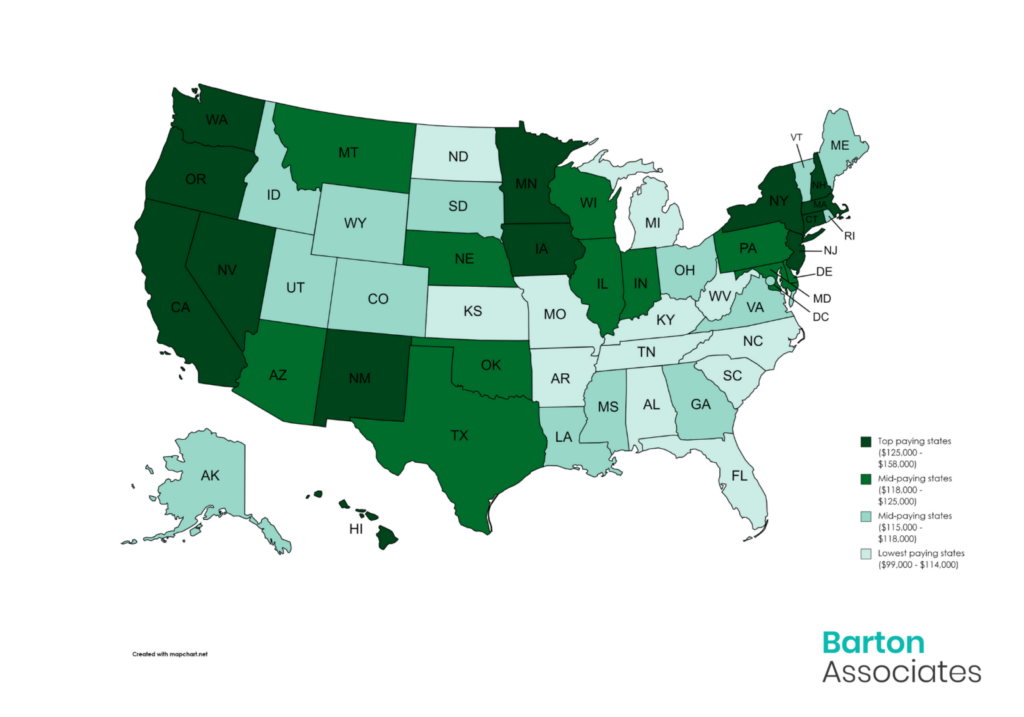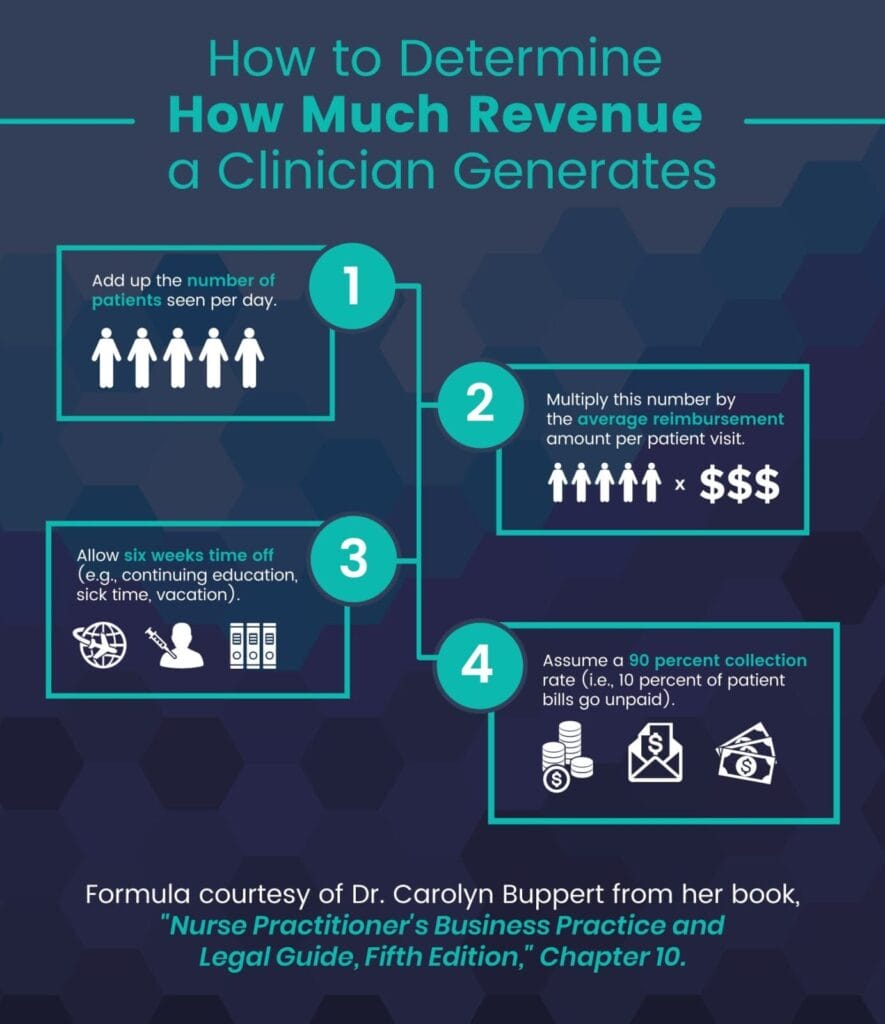If you’re an active nurse practitioner (NP) or considering nurse practitioner jobs, it’s helpful to have informed salary expectations. So, how much revenue does the average NP generate. The answer is surprisingly complex, because of the number of variables that impact a nurse practitioner’s earnings potential.
In this article, we’ll break down some of the top questions related to nurse practitioner salaries and earnings potential. Looking for a salary breakdown for a specific nurse practitioner specialty? Check out our comprehensive nurse practitioner salary guide here.
- What Do Nurse Practitioners Make on Average?
- In What States Do Nurse Practitioners Make the Most Money?
- What NP Specialty Makes the Most Money?
- How Much Do Locum Tenens NPs Make?
- Nurse Practitioner Salary Trends
How Much Do Nurse Practitioners Make in a Year?
Nurse practitioners make $121,610 annually, according to the United States Bureau of Labor, when they last updated the figure in May 2022.
Medscape‘s 2022 compensation report, which surveyed 1,500 nurse practitioners about their salary in the previous year found similar results. The median NP made $111,000 in salary and $118,000 in total, including productivity bonuses, overtime, and incentive pay.
This, of course, doesn’t factor in specialty, experience, or region, all of which are considerable factors for locum NP earnings. These numbers are all also for perm NPs, which tend to make less money on an hourly basis than their locum counterparts.
State by State Salary for NPs

Here’s how much nurse practitioners make annually in each state, according to the BLS:
- Alabama nurse practitioners make $107,000 annually
- Alaska nurse practitioners make $116,000 annually
- Arizona nurse practitioners make $121,000 annually
- Arkansas nurse practitioners make $107,000 annually
- California nurse practitioners make $158,000 annually
- Colorado nurse practitioners make $116,000 annually
- Connecticut nurse practitioners make $131,000 annually
- Delaware nurse practitioners make $121,000 annually
- Florida nurse practitioners make $110,000 annually
- Georgia nurse practitioners make $116,000 annually
- Hawaii nurse practitioners make $128,000 annually
- Idaho nurse practitioners make $118,000 annually
- Illinois nurse practitioners make $122,000 annually
- Indiana nurse practitioners make $122,000 annually
- Iowa nurse practitioners make $128,000 annually
- Kansas nurse practitioners make $112,000 annually
- Kentucky nurse practitioners make $109,000 annually
- Louisiana nurse practitioners make $118,000 annually
- Maine nurse practitioners make $118,000 annually
- Maryland nurse practitioners make $120,000 annually
- Massachusetts nurse practitioners make $139,000 annually
- Michigan nurse practitioners make $114,000 annually
- Minnesota nurse practitioners make $128,000 annually
- Mississippi nurse practitioners make $117,000 annually
- Missouri nurse practitioners make $113,000 annually
- Montana nurse practitioners make $120,000 annually
- Nebraska nurse practitioners make $119,000 annually
- Nevada nurse practitioners make $136,000 annually
- New Hampshire nurse practitioners make $126,000 annually
- New Jersey nurse practitioners make $143,000 annually
- New Mexico nurse practitioners make $130,000 annually
- New York nurse practitioners make $152,000 annually
- North Carolina nurse practitioners make $114,000 annually
- North Dakota nurse practitioners make $114,000 annually
- Ohio nurse practitioners make $117,000 annually
- Oklahoma nurse practitioners make $122,000 annually
- Oregon nurse practitioners make $136,000 annually
- Pennsylvania nurse practitioners make $121,000 annually
- Rhode Island nurse practitioners make $125,000 annually
- South Carolina nurse practitioners make $109,000 annually
- South Dakota nurse practitioners make $116,000 annually
- Tennessee nurse practitioners make $99,000 annually
- Texas nurse practitioners make $125,000 annually
- Utah nurse practitioners make $116,000 annually
- Vermont nurse practitioners make $176,000 annually
- Virginia nurse practitioners make $117,000 annually
- Washington nurse practitioners make $136,000 annually
- West Virginia nurse practitioners make $107,000 annually
- Wisconsin nurse practitioners make $121,000 annually
- Wyoming nurse practitioners make $115,000 annually
In What States Do Nurse Practitioners Make the Most Money?
NPs in the Westernmost states reported the highest earnings; NPs in the Pacific region cited earnings of $140,000 per year. They were followed by West South Central (Texas, Oklahoma, Arkansas, and Louisiana) and the Mid-Atlantic region at $123,000. East South Central NPs (Alabama, Mississippi, and Tennessee) reported the lowest earnings at $108,000 per year.
How much do nurse practitioners make an hour?
Locum NPs across specialties make $93 per hour on average over the last year. If you were to extrapolate that rate over a year (at 40 hours per week), the average locum salary comes out to $193,000.
There are several reasons you can’t directly compare the hourly wages of a locum worker to a salaried worker or an NP who operates their own practice, but it does underscore the fact that on an hourly basis, locums tend to earn significantly more than their perm counterparts.
Medscape’s 2022 compensation report, compared the annual earnings of NPs who were paid by salary and those who were paid by the hour, (including locum NPs) and found the average annual earnings of NPs paid hourly to be $143,000 – that’s a 22% increase over the salary for perm NPs.
Which NP Specialties Make the Most Money?
Nearly all nurse practitioners hold advance practice certifications, and a full half (51%) hold the family NP certification. Family NPs, however, reported the lowest salaries of all advanced certifications at $117,000. Psychiatric mental health NPs reported the highest salaries at $132,000.
For locum tenens nurse practitioners, NPs in surgery specialties tend to make the most money. While the average locum NP makes between $65 and $110 per hour, NPs in surgery specialties make an average range of $90 to $150 per hour. The highest earning surgery NPs make even more than the upper end of the median range.
How much can a nurse practitioner make with their own practice?
If you’re looking for a formula on how to calculate your own earnings potential as a primary care NP, Dr. Carolyn Buppert provides one in her textbook, Nurse Practitioner’s Business Practice and Legal Guide, Fifth Edition:
Dr. Buppert provides the following formula: # of patients seen per day multiplied by amount earned on average per patient multiplied by collection rate.

How Much Revenue Does a Nurse Practitioner Generate?
For example, a primary care nurse practitioners see an average of 24 patients per day and are reimbursed an average of $70 per patient. In this scenario using Dr. Buppert’s formula, the nurse practitioner brings in $1,680 per day. Assuming a 90 percent collection rate and six weeks of time off, the primary care nurse practitioner brings in $347,760 per year.
To calculate the nurse practitioner’s deserved salary, Dr. Buppert deducts the following amounts from nurse practitioner–generated revenue:
The cost of practice expenses or hospital overhead per nurse practitioner varies widely, from 20 percent in large practices to 50 percent in very small practices. These expenses include rent, benefits, continuing education stipend, supplies, malpractice insurance, and depreciation of medical equipment. If the nurse practitioner does not receive health insurance benefits or paid time off, which may be the case for NPs working in some part-time or locum tenens roles, this percentage would be lower.
Physician consultation costs refer to the supervisory agreements that some states require. Employers often displace this cost, which is usually around 15 percent of their generated revenue, onto nurse practitioners. Furthermore, practice profit is the amount the employer wishes to keep for themselves, which is usually around 10 percent.
Deducting these percentages from the primary care nurse practitioner who generates $347,760 per year leads to a salary of $159,621. In a state without mandated physician consultation requirements, this same nurse practitioner would ideally earn a 15 percent higher salary (i.e., $177,357).
Nurse Practitioner Salary Trends
What should NPs expect in the coming years? Some signs point to positive compensation progress for nurse practitioners.
While all other APRNs reported no change year-over-year, NP compensation increased. However, this increase may reflect a response to previous salaries being insufficient. Less than half of nurse practitioners feel they are fairly compensated. This compensation dissatisfaction rate is first amongst all APRNs, including clinical nurse specialists (CNS), CRNAs, and NMs.
Looking for more educational nurse practitioner content? Check out our hub for nurse practitioner resources, or check out our popular guides on nurse practitioner licensing, NP scope of practice, independent practice, and nurse practitioner specialties. And be sure to explore our nurse practitioner salary guide.
